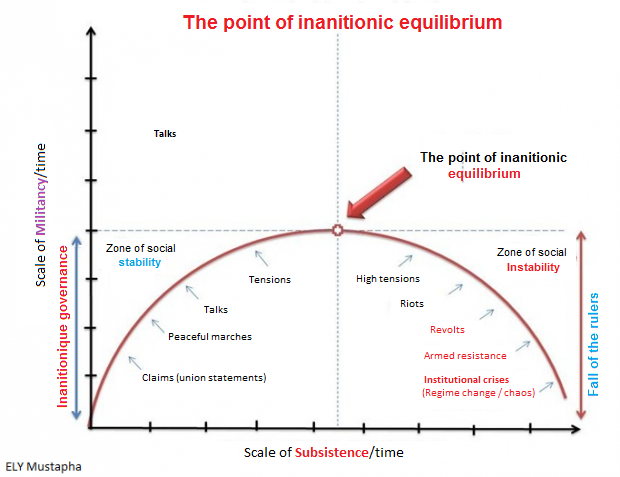*Inanitionic: Adjective non-existent in the English language that we have invented by construction on the term “inanition” which means “state of exhaustion of the organism caused by lack of food”.
Since the time we observe our leaders, it has appeared to me that their mode of governance has never been defined in a scientific approach devoid of the weight of Western ideas which often, wrapping a philosophical spirit of high flight the concept of governance, prevent the appreciation of its true reality; at least in our developing countries. This justifies this test of an approach to manifest governance, through starvation.
If politics, it was said, is “the Art of compromise”, it is certain that in our countries it is a compromise between bad faith and faith bad. Good faith has rarely penetrated the political space of our rulers, at least not for those who succeeded the fathers of independence.
In order for this theory of governance, that we are going to develop, to take off, certain Western ideas should be put on the “back burner” such as: “the people’s government of the people” or the “right of peoples to dispose of them” themselves or their natural resources “or” human rights, economic, social and cultural rights “etc.
In truth, our rulers pretending to apply them in the framework of “good governance”, use it only as slogans to attract international public aid, acquire special drawing rights as well as donations and subsidies of some international organizations that believe they have become “good students” of their economic ideology.
The reality is different.
Our leaders have long ago found a very subtle way to continue to govern and “sail” the entire international community. They discovered the “vein” of governance built on “the inanitional balance *”. Hitherto, it has never been approached in the economic vision of underdevelopment; it must be defined, theorized and schematized.
I will define the “inanitionic equilibrium” as the point of socio-political stability in which is a people subjected to two contrary forces: hunger and satiety.
This “inanitional balance” is for us the empirical formulation of economic Machiavellianism.
In simple language, “the inanitionic equilibrium” is reached when the citizen (“numerical unit” of a people), caught between the needs of basic subsistence and the acquisition of goods, always insufficient, to ensure his food autonomy, is neutralized politically … through its “momentum” of economic sustenance.
In other words, the inanitionic governance is the set of measures that the rulers take to prevent their people from being well nourished, because it would then be interested in their policy but never starve it to avoid that they rebels.
The postulate is: a people who are not hungry ends up interested in politics but a hungry people eventually revolt.
This problematic, solved by resorting to the “inanitionic governance”, is : How to make so that the people can never eat their hunger so that they devote their daily life in search of their pittance (thus forgetting politics), but they can find just enough food to stay manageable.
It is this balance that our governments are looking for and that keeps them in place.
The “good” inanitionic ruler is one who knows how to make the people approach the starvation threshold while preventing them from crossing it.
To do this, he deploys a politico-economic machinery, punctual actions (salary-drifting enhancement, social benefits, etc.) in which he presents himself as the providential governor (arsonist and firefighter) helped often by national and international financial organizations.
Indeed, how can we explain that the people of countries so rich (in soil and subsoil resources, terrestrial and maritime) languish in misery?
The wealth is often staggering that neither the squandering of the rulers nor the corruption could exhaust and yet the people are often totally deprived. In fact, the rulers in this form of inanitionic governance formulate their Machiavellian economic policy in the sense of this inanitic equilibrium.
If one converts the effort that the citizen devotes to the search for his subsistence and the effort he devotes to political action in time, the relationship between these two magnitudes gives the degree of “success” of inanitionic governance»
By assigning to the first the name of “Time subsistence” and the second “time militancy”, the point of inanitionic equilibrium will be expressed by the ratio:
Militancy time / Subsistence time.
Inanitionic governance is all the more accomplished when the quotient of this ratio tends to 1. His point of balance.
When this ratio, takes negative values, less than 1, (the subsistence time is high) governance enters into crisis. It is the “zone of social instability”, characterized by violence (tensions, riots, revolts etc.)
When the value of this quotient is greater than 1, so positive (the time of militancy is high), it means that the time devoted to the subsistence is reduced to the profit of the time of militancy. Governments are then the focus of the citizen and the demand for their accountability and management is triggered. It is the “zone of social stability” characterized by non-violent but no less oppressive demands on the government (strikes, negotiations, demands, peaceful marches).
So the higher the quotient is, the more the citizen is interested in politics (the time spent on subsistence being reduced) and it is still a threat to the managers practicing mismanagement. The citizen, then interested in politics, will then demand their accountability (report on their management).
To prevent their citizens from entering the first or the second zone, both of which are zones of turbulence for them, the rulers seek to steer their (socio-economic) policy with the exact coordinates of this “point of contact”. ‘balance’. Their salvation and longevity depend on their ability to stay the course towards the point of equilibrium inanition and reach it as quickly as possible.
The point of Inanitionic equilibrium is the way of salvation to their bad governance.
We can schematize this equilibrium point as follows:

Pr ELY Mustapha